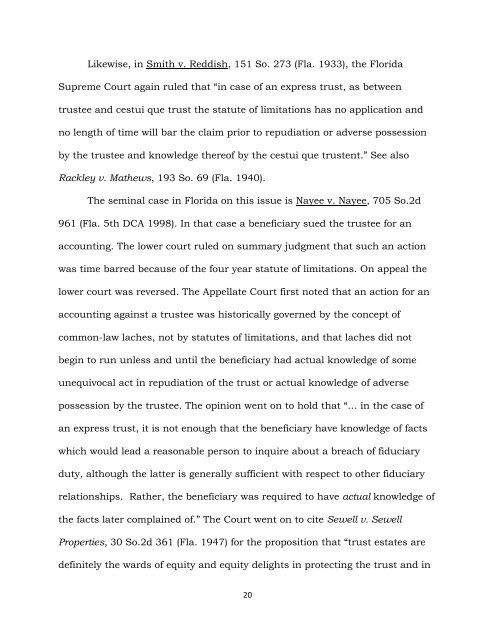Holding the Trustee Accountable - Baskin Fleece
Holding the Trustee Accountable - Baskin Fleece
Holding the Trustee Accountable - Baskin Fleece
You also want an ePaper? Increase the reach of your titles
YUMPU automatically turns print PDFs into web optimized ePapers that Google loves.
Likewise, in Smith v. Reddish, 151 So. 273 (Fla. 1933), <strong>the</strong> Florida<br />
Supreme Court again ruled that “in case of an express trust, as between<br />
trustee and cestui que trust <strong>the</strong> statute of limitations has no application and<br />
no length of time will bar <strong>the</strong> claim prior to repudiation or adverse possession<br />
by <strong>the</strong> trustee and knowledge <strong>the</strong>reof by <strong>the</strong> cestui que trustent.” See also<br />
Rackley v. Ma<strong>the</strong>ws, 193 So. 69 (Fla. 1940).<br />
The seminal case in Florida on this issue is Nayee v. Nayee, 705 So.2d<br />
961 (Fla. 5th DCA 1998). In that case a beneficiary sued <strong>the</strong> trustee for an<br />
accounting. The lower court ruled on summary judgment that such an action<br />
was time barred because of <strong>the</strong> four year statute of limitations. On appeal <strong>the</strong><br />
lower court was reversed. The Appellate Court first noted that an action for an<br />
accounting against a trustee was historically governed by <strong>the</strong> concept of<br />
common-law laches, not by statutes of limitations, and that laches did not<br />
begin to run unless and until <strong>the</strong> beneficiary had actual knowledge of some<br />
unequivocal act in repudiation of <strong>the</strong> trust or actual knowledge of adverse<br />
possession by <strong>the</strong> trustee. The opinion went on to hold that “… in <strong>the</strong> case of<br />
an express trust, it is not enough that <strong>the</strong> beneficiary have knowledge of facts<br />
which would lead a reasonable person to inquire about a breach of fiduciary<br />
duty, although <strong>the</strong> latter is generally sufficient with respect to o<strong>the</strong>r fiduciary<br />
relationships. Ra<strong>the</strong>r, <strong>the</strong> beneficiary was required to have actual knowledge of<br />
<strong>the</strong> facts later complained of.” The Court went on to cite Sewell v. Sewell<br />
Properties, 30 So.2d 361 (Fla. 1947) for <strong>the</strong> proposition that “trust estates are<br />
definitely <strong>the</strong> wards of equity and equity delights in protecting <strong>the</strong> trust and in<br />
20


